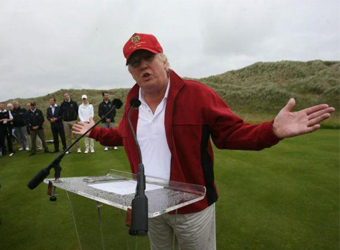U.S. President Donald Trump is likely to come to the UK next year, the BBC understands.
Downing Street and the White House are believed to be looking at options for the visit.
Mr Trump accepted the Queen’s invitation for him to travel to Britain on a state visit when UK PM Theresa May visited Washington in January.
But the prospect of a state visit caused much controversy and reportedly led Mr Trump to change his mind.
It was said he did not want to visit while there was potential for protests against him.
Nearly two million people signed one of a number of petitions saying Mr Trump should not be invited to the UK on a state visit.
Senior politicians, including Labour leader Jeremy Corbyn and former Lib Dem leader Tim Farron who called Mr Trump “an embarrassment to America”, said the visit should not go ahead. Questions were also raised as to why Mr Trump was invited so soon after taking office – it was two-and-a-half years into his first term before his predecessor Barack Obama came to the UK for his state visit.
Questions were also raised as to why Mr Trump was invited so soon after taking office – it was two-and-a-half years into his first term before his predecessor Barack Obama came to the UK for his state visit.
May extended the invitation to the president just as he sparked anger across the world with his proposed travel ban on visitors from seven predominantly Muslim countries.
The mayor of London, Sadiq Khan, clashed with Mr Trump over the immigration measures, later saying the UK should not “roll out the red carpet to the president of the USA in the circumstances where his policies go against everything we stand for”.
Confirmation of Mr Trump’s visit had been expected in last month’s Queen’s Speech, in which the Queen set out her official plans for the year.
But there was no mention of it, and October was later mooted as a possible date.
The White House denied reports that Mr Trump had reservations about visiting, saying they looked forward to working out a “mutually acceptable date”.
The Queen usually receives one or two heads of state a year. She has hosted 109 state visits since becoming monarch in 1952.
State visits are grand, ceremonial occasions, but have a political purpose too, with governments using them to further what they see as Britain’s national interests.
Source: BBC


